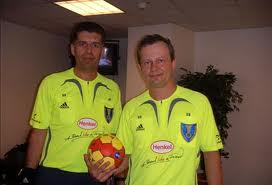I am sure we would be amazed if one of the top teams in the Olympic tournaments announced that they would bring a very young team, with only one player having previous Olympic experience. And nobody tends to suggest that experience is not relevant in the refereeing, so perhaps you will find it shocking when I point out that only ONE of the 17 nominated couples has experience from a previous Olympic tournament. This is the couple Krstic/Ljubic from Slovenia. But before you start getting nervous, I will try to provide some explanations and reassurances.
Olesen/Pedersen (Denmark) and Lazaar/Reveret (France) handled the medal games already in the 2009 Men’s World Championship, so they are no newcomers. The Spanish couple Raluy/Sabroso handled the men’s final in 2011, and the Norwegians Abrahamsen/Kristiansen handled the final in EURO 2012, apart from having been at the top level for quite some time. Geipel/Helbig from Germany have three World Championships under their belt, and they are remarkably the only German handball presence on the court in London, as the German teams did not qualify.
The ‘Balkan’ referees, apart from Kristic/Ljubic, tend to be among the younger members: Gubica/Milosevic (CRO), Nachevski /Nikolov (MKD), and Nikolic/Stojkovic (SRB). The same goes for the Czechs Horacek/Novotny. But all these couples have been in men’s and/or women’s World Championships at least once. France is the only nation with a second couple, as the Bonaventura sisters are one of the two women referee couples. The other one is Florescu/Duta from Romania. It may seem as if two women’s couples is not a lot, but it is in fact an important milestone on the way towards, one hopes, a more balanced composition at the top.
As always at the Olympic Games, the host country is entitled to have both teams and referees participating. This is not the first time that the Olympics have been held in a country with modest handball standards, and it requires a careful balancing act to fit these rather inexperienced referees, Bartlett/Stokes, into the match schedule. From Panamerica, the nominees are Marina/Minore (ARG) and from Africa Coulibaly/Diabate (CIV). The Asian continent sends two couples: Al-Suwaidi /Bamatraf (QAT) and Al-Marzouci/Al-Nuaimi (UAE). These non-European couples have the disadvantage of not being able to gain the same match experience as the European, but they are the best ones in their respective continents at this point. And all of them have handled one or two World Championships.
So what are then the explanations for the major rejuvenation of this top group? It is really a combination of two factors: first, the demands on the top referees are in several respects so great, that they can no longer combine this hobby (which is essentially what it is) with career and family responsibilities for very long. In the past, the typical career for an IHF top couple may have lasted for about 15 years, from around age 35-37 up to the age limit of 50. But that duration does not tend to be realistic any longer, especially in Europe, where the combined demands at the national level and from the many EHF games are considerable. So it was not surprising that more than half of the European referees who were in Beijing in 2008 retired soon afterwards, well before the age of 50.
But the need for rejuvenation had been anticipated by the IHF, and a pipeline in the form of the Global Referee Training Program had been created. In other words, the IHF actively seeks out young talents and puts them through systematic training, testing and observation. This makes it realistic to bring individual couples faster and earlier to the top level. And this combines nicely with the reality that nowadays the physical and mental demands of the game at the elite level necessitate having referees who are in top shape and can handle the speed and physicality without fatigue and loss of concentration. However, as I said at the outset, experience is also a key component for successful refereeing, so it will be interesting to see how the group in London will collectively withstand the pressures and handle its importing task. We wish them success!

